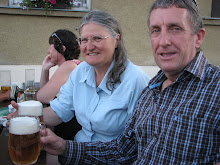
Qingdao is the fourth-largest port in China.

It is so different from other places in China we have been to. It is a coastal city and quite hilly in places. There is a lot of demolishing, construction and renovating going on. The main railway station is closed for remodelling for the Olympic games and we wonder if it will be open on time as there are no buildings above ground level yet!

The Olympic sailing events will be run here and we wonder how the visitors will be able to navigate the city. The maps that are produced in English are useless as most streets on it are written in Chinese script. None of the bus signs are in English either. We know enough about how things work and can get about quite well but newcomers are going to have some problems unless they come up with some better systems soon.
The Olympic Village under construction

We caught a local bus to the regatta village site and it is still closed as the work continues and it is hard to imagine that they will be ready before the games. The blocks of buildings have only their concrete frames constructed and are covered with scrim and scaffolding. There are no walls. We saw truck loads of fully grown trees arrive ready for planting so at least the grounds will look as though they have been there forever.

The city has dozens of parks and they are well laid out and full of people. The kite fliers are amazing and as a kite fan I could have bought them all to try out. Some of the 'fighting kites' have 4 strings and look like they could lift the flier off the ground.
The parks have interesting statues as well. They are great places to people watch.

Kaiser Wilhelm11 avenged himself for the killing of two German missionaries by coercing the Manchu government to cede Qingdao to Germany in 1898 for 99 years. The Tsingtao Brewery opened in 1903, electric lights were installed, missions and a university established, the railway built,a garrisson of 2000 men was deployed and a naval base was established.
In 1914 the Japanese moved into town and they held the city until 1922 when it was ceded back to the Kuomanting. The Japanese returned in 1938, after the start of the Sino-Japanese war and occupied the town until defeated in 1945.

It has been entertaining watching the Chinese at play at the beach. They buy buckets and little nets and catch teeny tiny crabs, shrimps, and fish from the rock pools. Many of the women teeter over the rocks in their high heels and look so out of place. While they are enjoying their beach experience peddlers try to sell them prawn or squid kebabs, shell ornaments, maps or they want to take photographs of them posing on the rocks. There were no massages on offer as there are in other Asian beach resorts we have visited.

Some parts of the city look like they have been created in Europe. The church bells ring to announce the start of the day's service and this just adds to the feeling of being in Europe.

Qingdao is famous for its beer called Tsingtao. The Germans built a brewery and it continues today. We visited the brewery museum and they have this beer bottle statue.

Outside our hostel was this beer bar where you could buy draught beer and take it away in plastic bags. We tried it and it was very nice and much cheaper than what they sold in the hostel bar. Luckily we were able to hang the bag up on the wrought iron fence at the front of the hostel!

Anyone for an Olympic key ring souvenir with live goldfish inside?

